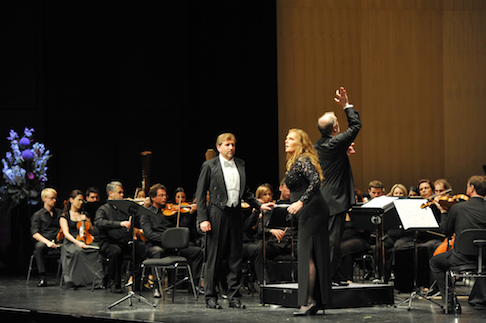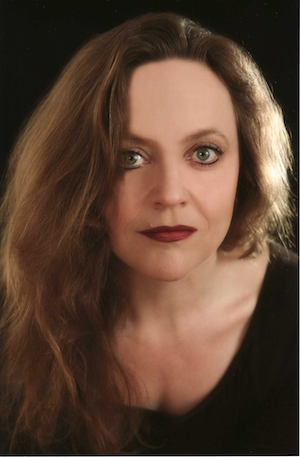20 Jul 2016
Die Walküre, Baden-Baden
A cast worthy of Bayreuth made for an unforgettable Wagnerian experience at the Sommer Festspiele in Baden-Baden.

A cast worthy of Bayreuth made for an unforgettable Wagnerian experience at the Sommer Festspiele in Baden-Baden.
Eva-Maria Westbroek (Sieglinde), Evelyn Herlitzius (Brünnhilde), Ekaterina Gubanova (Fricka), René Pape (Wotan) and Mikhail Petrenko (Hunding) sung on a scorching summer sunday under the guidance of Valery Gergiev and his Mariinsky Orchestra. Every singer produced sensational showstoppers. With such a cast a production is better left away.
The magnificent tenor Andreas Schager charmed the disappointed audience expecting a sick Jonas Kaufmann. With a touch of theatrical flamboyance Schager includes the audience intimately in his performance. As a singer he gives each of his characters his all. I have seen him go at it as Tannhauser in Ghent, Max in Der Freischütz in Berlin, and he was a major high point in Leipzig’s Ring Cycle last May, where he blew up the stage as Siegmund. Schager has also tackled Tristan in St. Petersburg with Gergiev, this evening’s conductor. His debut at the Met in NY is already programmed for the near future.
 Andreas Schager and Eva-Maria Westbroek
Andreas Schager and Eva-Maria Westbroek
Tonight, he returned as Siegmund for the Festspielhaus Baden-Baden, who managed to steal him away from his rehearsals for Der fliegende Holländer in his debut at Bayreuth. He again convinced as the overconfident hero. His performances have the sense that it might be his last.
From the moment Schager arrived on stage, the Austrian Adonis turned on his charm and dazzled. He has a soulful voice and big personality always intent on seducing the audience. In Leipzig, the Gewandhaus Orchestra was located in the pit, so he did not have the challenge of overcoming orchestral volume, a challenge he overcame most of the time with Gergiev and the muscular intensity of his body-builder Mariinsky. The challenge of balancing the volume was one of the few things that could have been more refined. But that was in Gergiev’s hands.
Schager’s chemistry with Westbroek was extraordinary. They elevated their duet to more than the sum of its parts. Their subtle acting and minimal gestures added great drama to this first act. Add to that the rich strings, swooning in their romance, and you were truly swept away as a listener. Schager and Westbroek’s fiery, passion moved me to tears. Epic was the revelation of his true name as first Sieglinde and then her brother exclaimed “Siegmund!”. It sent shivers down my spine.
Ms. Westbroek displayed her captivating acting skills, presenting Sieglinde highly expressive with great emotional authenticity, including her rich, relentless vibrato. She infused her declaration of love for her brother with generous exuberance. Later she contrasted this mania as she exuded a fearful malaise before Siegmund’s confrontation with her husband Hunding. A complete natural, her entire performance seemed hardly difficult, adding an almost laidback quality to the performance. How does she do it?
 Evelyn Herlitzius
Evelyn Herlitzius
Mikhail Petrenko must be admired for his flawless diction in German. You couldn’t detect his Russian accent at any point during his portrayal of Hunding, full of disdain and anger.
In Act II, Ekaterina Gubanova stole the show as the elegantly puritan and utterly disgruntled Fricka. Her voice commanded the stage, and she put Wotan to shame, in the best of ways, as Pape held his own. The climax of Act II had five world class singers on stage, and made for one of the most star-struck moments in opera that I have experienced. And one subtle moment of if-looks-could-kill emerged as Fricka arrived and Brünnhilde’s cheer diminished. That slight moment of eye-contact expressed volumes.
René Pape formidably portrayed Wotan with a sad, almost hopeless, resignation, as a leader at the end of his rule. In his interaction with Fricka in Act II, he displayed an authoritarian vocal prowess, demanding respect, yet still deeply human, perhaps too much so as God.
In Act III, Brünnhilde’s eight sisters threw themselves into Wagner’s vocal acrobatics as Gergiev turned the first half into a fully blown adrenaline rollercoaster. Yet it was the interaction between Wotan and Brünnhilde that left me helplessly sobbing, as the father cast his favorite daughter out of Valhalla. Such devastation I have rarely experienced from a stage performance. And while Wotan remains a bit distant, Evangeline Herlitzius turned me into an instant fan. Her Brünnhilde convinced in her virtuous optimism, but also displayed great dread for Wotan’s retribution. The singers elevated the performance to mythic heights.
In Act II Evangelina Herlitzius gave hint of what was later to come. But in Act III with Wotan she switched with seeming ease from upbeat enthusiasm, to great despair and all without too much theatricality. Her interaction with her disappointed father turned out to be the heartbreaking, gut wrenching finale that was necessary to conclude such a superlative concert.
Gergiev brought out the exhilarating passages of Wagner’s score. Brass sounded consistently brilliant or subtle with finesse in their simmering, swampy passages. Gergiev sustained a suspenseful momentum. He built up the Wagner’s tension effectively and knew to release it at the right moments.
With air conditioning, comfortable seating and such a stunning cast and orchestra, the question becomes…do you really need to still go to Bayreuth? Probably, because with a cast like this, it will be a long time before I will hear another so superlatively sung Die Walküre.
David Pinedo